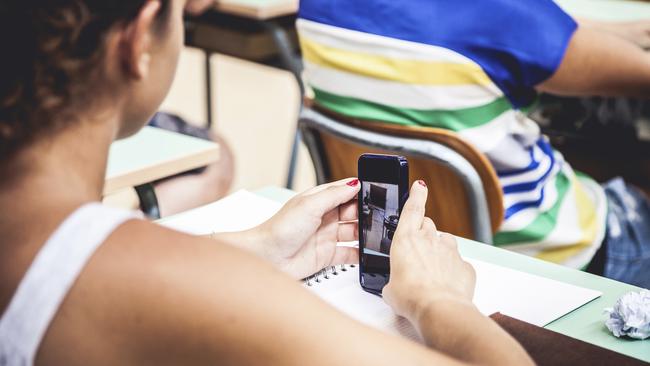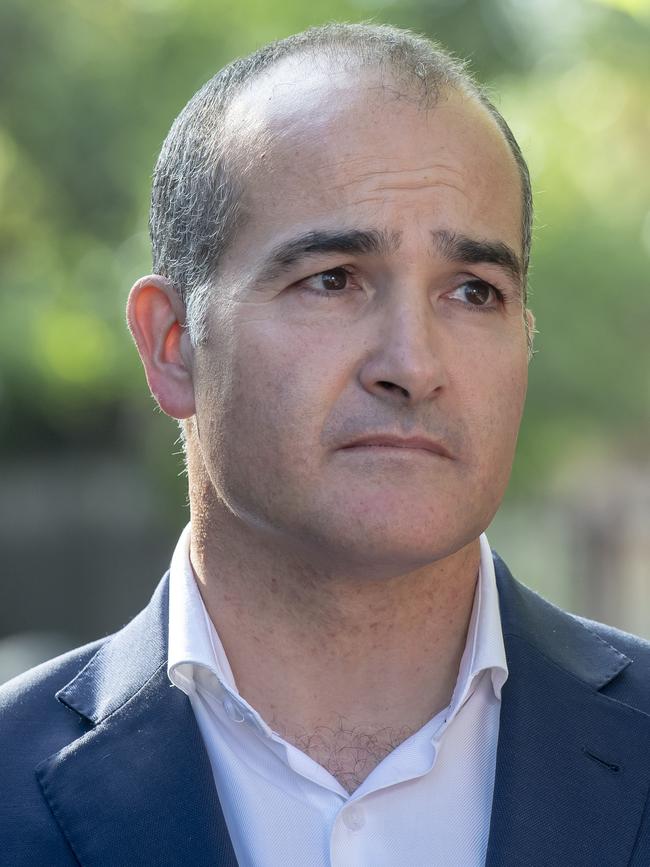Adam Voigt: School phone ban seems logical … but it won’t work
The ban on mobile phones in public schools is understandable but it won’t stop bullying or help to engage kids, writes Adam Voigt.
Opinion
Don't miss out on the headlines from Opinion. Followed categories will be added to My News.
I understand completely the thinking behind Victorian Education Minister James Merlino’s decision to ban students from using mobile phones in all Victorian public schools. But let’s be clear: it won’t work.
I get the frustration with the youth of today who seem to be permanently hunched over a device, unaware and apparently indifferent to the world around them.
I get the that we have a massive issue with bullying in our schools and that, since the invention of the internet and the development of social media, the habitat of choice for bullies is the insidious dark corners of the online world.

I also understand that there are many teachers out there frustrated by the vague, uncomprehending looks they see in their classrooms that are the result of students who are trying to look engaged while simultaneously checking underneath their desks how many Instagram likes they’ve cultivated on their last post.
But having said that, it still won’t work.
Bans have failed to bring about behavioural change throughout history. Consider the failure of Prohibition in the United States between 1920 and 1933 — and alcohol was only something people wanted, much less something they thought they needed.
The kids of today need technology and more than ever they need to know how to use it responsibly and productively.
A ban such as Merlino’s comprises two key ambitions: reducing bullying and increasing student engagement.

Let’s talk about bullying first. This ban will not impact bullying one iota. Bullying is all about power and unless we do something to limit the desire for power and status that young people are currently encouraged to have, we’ll change nothing.
Before technology showed up, bullying might have occurred via, say, a note passed under the desk. This ban is as futile as any attempt to ban pens and paper would have been 30 years ago. Sure, it makes us feel like we’re acting, but we’re merely removing a tool, not the cause of bullying.
Most online bullying doesn’t even occur during school hours anyway. It’s at home that we need to reduce technological access if bullying is really to be limited.
Secondly, let’s look at student engagement. Courtesy of the acclaimed McKinnon Secondary College example, the ban aims to ensure that “Teachers instruct from the front of the class, rather than watching for phones at the back”.
Unfortunately, the days of the authoritarian teacher at the front of the classroom, wielding power in order to force students to learn, are over. Any teacher worth their salt will tell you that the front of the room is no place to facilitate a collaborative and cooperative learning environment.
Many schools have seen the light on this and even gone as far as removing the teacher’s desk at the front of the room to illustrate that teachers are working with students rather than enforcing education on them.

The repositioning of teachers at the front of the classroom who are already struggling is pandering to those in the profession who need to adopt a different method, rather than use one that was established generations ago when education was an assembly line.
Schools have had the capacity to ban mobile phones for some time now. Many, specifically private and independent schools where bans are easier to enforce, have taken up that option.
But if you’re a teacher in a disadvantaged school, where educating is tough, you’ve just been handed a new compliance from the education minister. But now you must find a way to enforce the Merlino ban in the very place where enforcement will be hard and could turn out to be destructive.
Many of those teachers would rather have a student in a classroom with a mobile phone rather than have them out on the street doing drugs, hanging with gangs or planning their next B & E.
Connecting with those students requires a relationship that can’t be formed with a lesson that begins by frisking them for their iPhone.
And in the end, that’s what this ban is — an exercise in validation. Unfortunately, Merlino has drunk the Kool-Aid dispensed by self-proclaimed experts such as Dr Michael Carr-Gregg who has built a practice speaking to and validating the frustrations of parents who are also sick of their teenagers staring mindlessly into the online abyss.
MORE: EVERY SCHOOL SHOULD BAN PHONES
But here’s the truth and it’s an uncomfortable one. Those devices are going to be critical in their gainful employment. I certainly couldn’t do my work without my device and that is also true for every doctor, lawyer, tradie, small business owner and nurse — to name just a few.
Rather than ban a device of such importance, Merlino would be better following the example of schools such as Templestowe College, which have successfully incorporated technology into a model of education designed for the real world, rather than an irrelevant ideal from the 1950s.
— Adam Voigt is a former school principal and CEO of Real Schools


